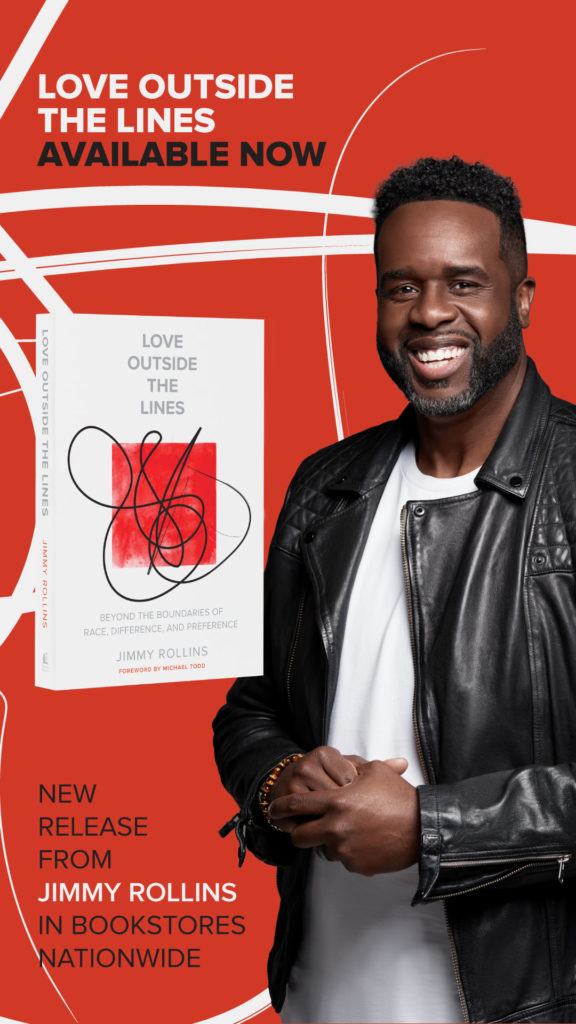We are excited to share a new resource written by Jimmy Rollins, Love Outside the Lines; Beyond the Boundaries of Race, Difference, and Preference.

Chapter 4
A Different Appetite
The Woman at the Well
Once Jesus and the disciples reached Samaria, they stopped at a place called Sychar to take a break. They were weary from travel and needed to be refreshed, so the disciples went to look for food and Jesus stayed behind at a well to rest. This wasn’t just any well; it was Jacob’s well. Jacob was a descendent of Abraham, the man we talked about in chapter 1 who originally heard God’s call to carry love outside the lines.
But thousands of years later, God’s people were still drawing lines around this town.
While Jesus was sitting there, a Samaritan woman walked up to the well to get water. It was the hottest part of the day, which was not the time most people go get water, so there was a good chance this woman was an outcast in her community. We find out in the story that she’d had five husbands. We don’t know why that was, but it’s easy to stereotype, isn’t it? It’s easy to jump to conclusions and assume it’s because she was doing something wrong. And apparently the rest of the town was doing the same thing, because she was ostracized and undesirable to her own Samaritan community, and so she had to brave the heat of the day on her own.
Because that’s what division does, right? It leaves us to brave the heat on our own. Between all the racism, classism, and ageism in our nation (and our world) today, the heat is being turned up. And the hotter it gets, the more divided we become. Many people I talk to resonate with this woman—they feel like they are being left to brave the heat of our culture on their own.
This woman was used to people drawing lines and excluding her from the party. And when she saw Jesus, a Jewish man, sitting at the well, she probably assumed the same old thing was going to happen all over again. Jesus began the conversation by asking her for something to drink. She was not used to anyone asking her for water, let alone a Jewish man, and it surprised her and threw her off so much that she started her response with, “You Jews . . .”
You can see the racist, classist, and sexist barriers just in the way she responded to Him. If there was ever a phrase guaranteed to push people away, it’s “You people.” You Black people. You White people. You poor people. You rich people.
It sounds as though her speech may have been seasoned with a hint of hate, a bit of distrust, and a lot of prejudice. She was putting Him in His place, classifying Him as not one of her own. We do the same thing today. Classism (prejudice for or against people belonging to a particular social class) is real, and it’s one of the major ways we draw lines and place people outside our in-group.
It’s time to start learning what it really means to follow Jesus.
We all need to be educated in loving outside the lines and outside classism, and Jesus taught a master class. He knew exactly what this woman was doing, and instead of approaching her about her lack He began the conversation with what she had to give.
Even in the face of tension and deep-rooted prejudice, He dignified her. She was a Samaritan, He was a Jew; she was a woman, He was a man; she was in sin, He did not sin. They were as different as different could be, and He started the conversation with a statement that showed that she had value to give.
The dictionary defines dignity as “the state or quality of being worthy of honor or respect.” This is where we begin. Dishonor and disrespect divide us, but dignity puts us on the path to unity.
You cannot have true diversity if you do not start with dignity. Desegregation didn’t begin in Maryland until the mid-1960s. My father grew up having to drink from a water fountain that was labeled “Colored Only.” We are many years away from that, and yes, the physical signs to keep us separate have been removed, but the impact remains.
We still live with unspoken rules of what we can and cannot do with certain people because of our biases and stereotypes. This is what Jesus addressed when He asked the Samaritan woman for water. He saw her as one of His own, and He dignified her.
Dignity is valuing a person, looking at them as having something to offer. I was recently discussing diversity with someone and they shared with me a list of their outreach initiatives. Dignity and diversity are not outreach initiatives! If I am asking you about your interactions with people who do not look like you and your first or only response to me is how you have helped the disenfranchised, then we have work to do.
We must uproot biases that have been around for years, go a different way, and talk to different people. It’s possible to have meaningful relationships with people who don’t look like us, but those friendships must start with valuing one another.
People aren’t problems to fix; they are human beings who deserve our love and respect. We must open the conversation with dignity and maintain that as we listen to one another. Do not reduce your diversity to service—or under the spiritual umbrella of “ministering to the poor”—as this does not pull up the roots of racism now disguised as classism. It is easy to pass out food, but Jesus had dinner with all kinds of people. It is easy to pass out a water bottle, but Jesus asked for a drink.
Throughout His conversation with the Samaritan woman, Jesus engaged without condemnation, without trying to drive a point home. He maintained that dignity all the way through, even while speaking some tough truths.
Jimmy Rollins is a nationally recognized speaker, marriage coach, and author who inspires diverse audiences to live beyond themselves on the journey to discovering their greater purpose. As a key strategic partner for several influential churches and para-church organizations Jimmy’s 25+ year ministry experience has been critical to architecting strategies to increase influence and realize greater impact. No matter the audience Jimmy’s trademark humor and transparency is sure to inspire and impact to all those who comes into contact with his message. Jimmy and his wife Irene have been married for over 23 years and reside in West Palm Beach Florida, where in 2021 they co-founded and lead their marriage ministry Two Equals One. They are on a mission to build the local church abroad by equipping pastors and leaders in their journey to a healthier happier marriage.


